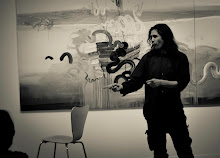What is Stand Up Philosophy

- matthew hammond
- This blog charts my attempts, in whatever way I can, and whenever I can, and as honestly as possible, to stand up for thinking - real thinking, whether in philosophy or politics, or maths - Because thinking needs standing up for!

Monday, May 28, 2012
Rousseau, or where tyrants come from
For me Rousseau is always unintentionally very funny (in all his pompous glory), and always very instructive. It is perpetually interesting to see an intuitive mind, a man who can feel more that he can prove in action. A kind of Philosophical everyman if you like. All the more so, because one sees the danger of such a methodology. For at times it is clearly very difficult for Rousseau, to distinguish prejudice from thought. This is particularly the case in this piece, from the start of the Social Contract, which is as infamous as it is famous. For in this essay, is enshrined for all to see, a series of mental switches, double takes and jumps in the face of adversity and complexity, that transform idealism into something terrifying and inflexible. What is even more telling, is that it is clear that Rousseau himself, is utterly unaware of what we are seeing. He knows that 'He is a reasonable man', and feels that he is merely responding, pragmatically and robustly to the problems which his argument faces, and is going where it ought to lead...but the modern reader sees something quite different. For here written, quite transparently, and with a chilling if chirpy self confidence, are the series of transformations that warp even the most liberal of modern politicians, of all parties and creeds, and see them move from idealistic ambition, through pragmatic dogmatics to repression. The Social Contract is, more truly than its author could have meant, a manifesto for contemporary democracy, for it clearly re-stages one of the great tragi-comedy dramas of modern times, the drama of political idealism, and its corruption, and does so in the (musical) key of hope. But the really strange part about this movement is not that it happens, but that we sometimes convince ourselves that it will not happen; and that this is the young, idealistic leader, who will somehow at last triumph, if only we support them... So that, and in spite of ourselves, the theatre of our democracy demands that we are all caught up, and complicit in the hope as well as witnesses of the despair.
Hence the aim of this performance of the Social Contract must be to sweep the audience along. They ought to start in hope and feel that the performance really might be going Somewhere, that this might be at last The Change or a Utopia We Might Believe In. The movement to the darker side of the argument must be subtle and gradual, so that for the most part the argument must appear to sound reasonable, or at least better than the alternative...and only at the end, should the full implication of all that seemed so clear and reasonable at first, be apparent in all their terrors. An all too familiar drama that catches us all up in it, so that it is the same for Rousseau as it is Robespierre, Blair and for us. We all have a part in the inflexible hopes and the implied villainies, whose complicated nature 'The Social Contract' reveals (if unintentionally) so very well....
Subscribe to:
Post Comments (Atom)
No comments:
Post a Comment